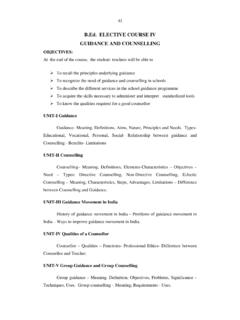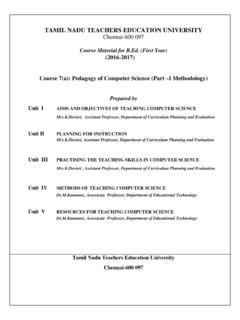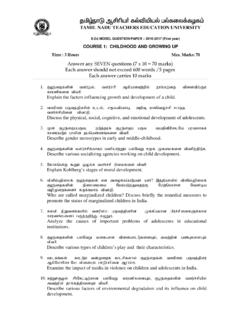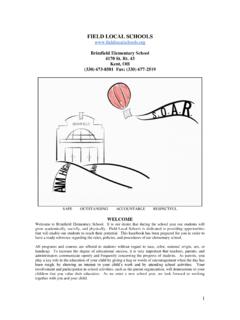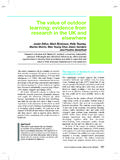Transcription of B.Ed ELECTIVE COURSE III ENVIRONMENTAL EDUCATION
1 38 ELECTIVE COURSE III ENVIRONMENTAL EDUCATION Objectives: At the end of the COURSE , the student- teachers will be able to understand the concept of environment and ecology To understand ENVIRONMENTAL EDUCATION and its importance To understand the causes for ENVIRONMENTAL hazards and pollution To understand the causes for ENVIRONMENTAL degradation To understand the need for remedial ways to protect the environment in daily life and its application To acquire knowledge of ENVIRONMENTAL issues and policies in India To acquire knowledge about the international efforts for ENVIRONMENTAL protection To understand the status of ENVIRONMENTAL EDUCATION in school curriculum To understand the curriculum and methods in ENVIRONMENTAL EDUCATION To acquire knowledge about the different methods of teaching in ENVIRONMENTAL EDUCATION To acquire knowledge of
2 The tools and techniques for the evaluation of ENVIRONMENTAL EDUCATION UNIT I Objectives, Scope and Nature of ENVIRONMENTAL EDUCATION a) Meaning, definition and characteristics of ENVIRONMENTAL EDUCATION content. b) Importance, objectives, scope and guiding principles of ENVIRONMENTAL EDUCATION . c) Factors of degradation of environment adverse socio economic impacts of degradation of environment. UNIT II ENVIRONMENTAL EDUCATION and Pollution Meaning and definition of ENVIRONMENTAL hazards and pollution Types of ENVIRONMENTAL hazards and disaster Types of pollution: Land, Air, Water, Noise, and Radiation- Green house effect- Ozone layer depletion. 39 UNIT III ENVIRONMENTAL Management and Protection Need for ENVIRONMENTAL management function and characteristics of ENVIRONMENTAL management dimensions of ENVIRONMENTAL management.
3 Factors responsible for flora and fauna extinction Measures to conserve flora and causes for forest fire- measures of prevention UNIT IV India and ENVIRONMENTAL Issues and Policies Major ENVIRONMENTAL problems in India ENVIRONMENTAL protection and polices in India Need and objectives of conservation ENVIRONMENTAL conservation measures taken in India Constitutional amendments made and ENVIRONMENTAL laws UNIT V ENVIRONMENTAL Movements and Developments ENVIRONMENTAL movements in India: Silent Valley movement, Chipko movement, Narmada Bachao, Andolon, National Test Range at Baliupal, Orissa conditions for achieving the goals of sustainable development Strategies for sustainable development in India. UNIT VI International Efforts for ENVIRONMENTAL Protection The Stockholm conference 1972 Brundtland commission 1983 Nairobi conference 1982 The Rio Summit 1992 the Rio Declaration at the earth charter Major achievements of the Rio Summit Main features of the Rio Declaration Kyoto conference and part on Global Warming 1997.
4 UNIT VII ENVIRONMENTAL EDUCATION in the School Curriculum ENVIRONMENTAL EDUCATION at Primary, Secondary and Higher EDUCATION level Major constraints for its implementation at these level - Teacher s role national resource center for ENVIRONMENTAL EDUCATION . UNIT VIII ENVIRONMENTAL EDUCATION and Educational Technology Impact of Science and technology on environment degradation of resources Role of individual in conservation of natural resources- Role of information technology in ENVIRONMENTAL and human health. UNIT IX Methods of Teaching in ENVIRONMENTAL EDUCATION a) Characteristics of good teaching method. 40 b) Seminar, Workshop, Problem solving, field trips and Surveys, Projects, Exhibition and other methods. c) Relative efficiency of teaching methods.
5 UNIT X Evaluation approach of ENVIRONMENTAL EDUCATION Evaluation: Meaning, aims Different types of test and examination for assessment- prepare a blue print and question paper. SUGGESTED REFERENCE BOOKS: Sharma, R. A. (2008). ENVIRONMENTAL EDUCATION . Meerut: Books Depot. Sharma, B. L., & Maheswari, B. K. (2008). EDUCATION for ENVIRONMENTAL and Human value. Meerut: Books Depot. Kumar, A. (2009). A text book of ENVIRONMENTAL science. New Delhi: APH Publishing Corporation. Singh,Y. K. (2009). Teaching of ENVIRONMENTAL science. New Delhi: APH Publishing Corporation. Sharma, V. S. (2005). ENVIRONMENTAL EDUCATION . New Delhi: Anmol publication. Reddy, P. K., & Reddy, N. D. (2001). ENVIRONMENTAL EDUCATION . Hyerabad: Neelkamal publications. Kelu, P. (2000). ENVIRONMENTAL EDUCATION : A conceptual analysis.
6 Calicut: Calicut University. Agarwal, and Aggarwal, (1996) ENVIRONMENTAL Protection, EDUCATION and Development. New Delhi: New Concepts. Bondurant, J. V. (1996). Teaching tolerance: Raising open minded Emphatic Children. New York: Doubleday. Ingelstam, M. (1996). Empowered for peace service: A curriculum for EDUCATION and training in violence prevention, non-violence conflict transformation and peace building. Stockholm: Christian Council of Sweden. Board of EDUCATION Fountain. (1999). Peace EDUCATION UNICEF. NY: UNICEF. Eisler, J. (1994). Comprehensive conflict result program (1993-94). New York: N. Y. City. Joy, P., & Neal, P. (1994). The handbook of ENVIRONMENTAL EDUCATION : London, New Fetter Lane 41 Sharma, R. G. (1986). ENVIRONMENTAL EDUCATION .
7 New Delhi : Metropolitan Book Co., Pvt. Ltd.
